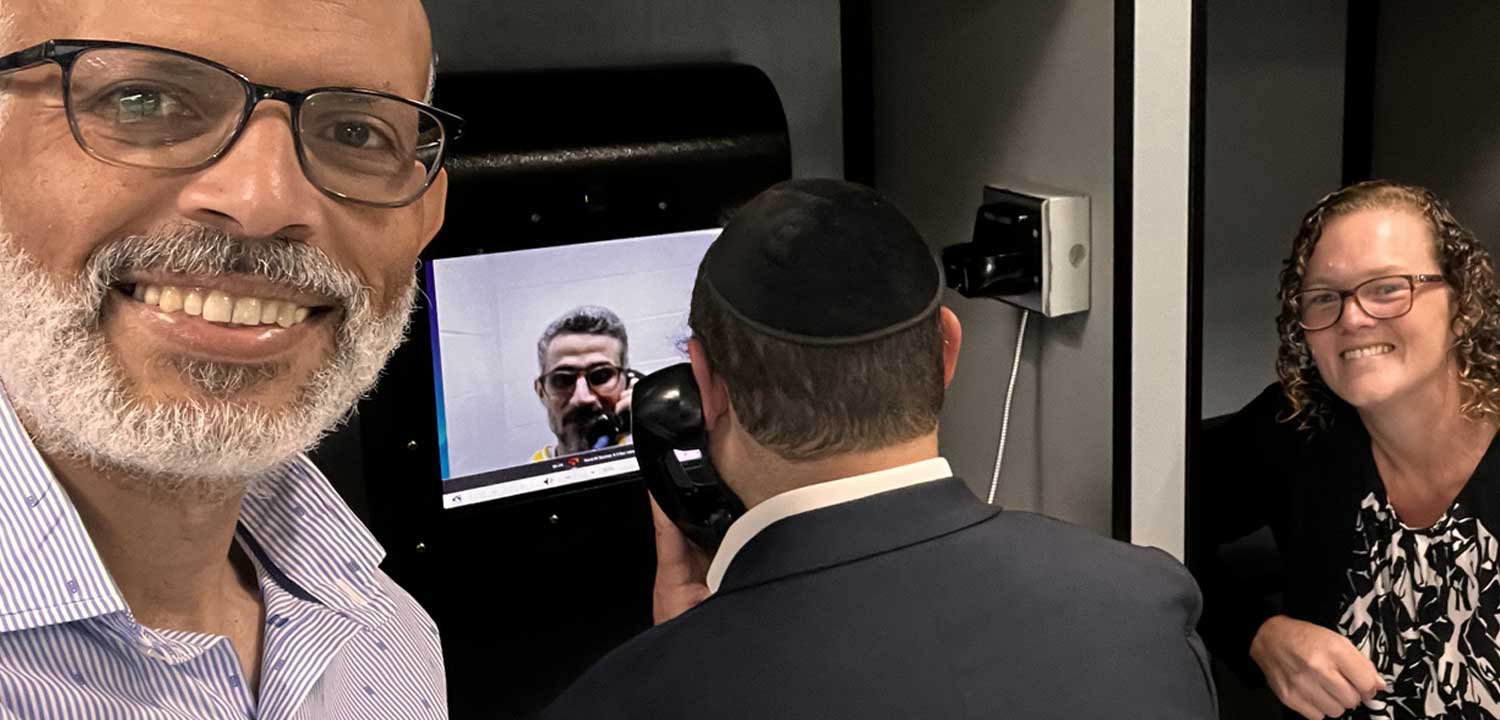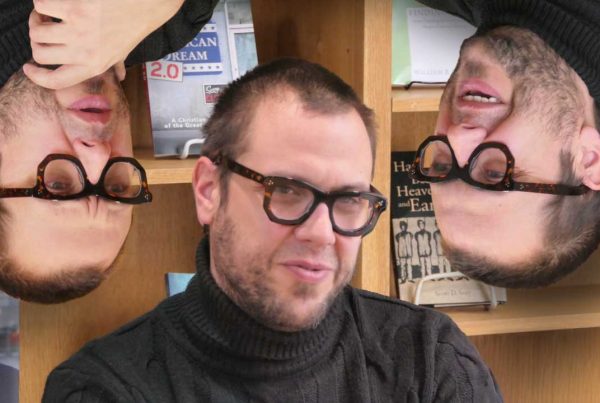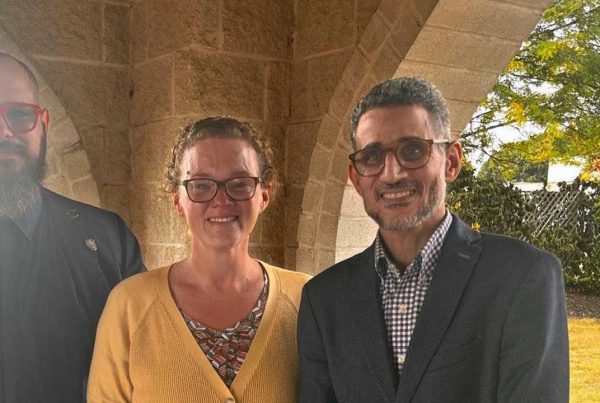Answering God’s Call, No Matter the Cost
What I Lost When I Spoke for a Detained Colleague — and Why I’d Do It Again
Editorial by Elizabeth Diop (MDiv ’15)
The Detention
I held it in during our emergency meeting at work. Bit my cheek. Pursed my lips to stop the quivering of my chin. Inhaled a little deeper to soothe the hitch in my breath.
Ayman Soliman. My beloved colleague. Faith leader. Chaplain. A man of compassion and moral courage. An asylum seeker. Imam. Chaplain.
Detained. Incarcerated.
Because he had the audacity to come to the United States, believing that here, he would be safe.
At the press conference that afternoon, it was hard to hear from behind the leaders speaking. But I caught that Ayman had been interrogated for hours. I hadn’t known that.
I let the tears fall. Wiped them with the collar of my shirt.
His work authorization was abruptly taken from him. A hearing pushed back.
His lawyers had expected that day’s immigration check-in to be routine.
They were wrong.
For the past four years, Ayman has been part of our spiritual care team, serving children and families with integrity, humility, and love. His presence has been a gift to our hospital and community.
He faithfully accompanied families through their most painful moments. He lifted prayers of celebration as parents prepared to bring their children home. He stood beside them as they held their child for the last time.
Word’s can’t fully express the comfort and hope Ayman’s presence brought in those agonizing moments.
And now he can’t. Because we have an immigration system that punishes the vulnerable and preys on the innocent.
My favorite memory with him? Two Muslim teenagers in our residential program wanted to visit the mosque during the holy month of Ramadan. He helped coordinate a supervised outing, found mosque-appropriate clothing for them, and welcomed them at the door like royalty. He led prayers, involved them in worship, and sat with them at a reserved table for Iftar supper.
I wish you could have seen the joy and pride on their faces. They’ll never forget that night.
And now? He’s in a cell.
The Open Letter
After the press conference, we clergy leaders gathered to plan next steps. I agreed to draft an open letter for clergy to sign in support of him. I didn’t know how to write an open letter. I didn’t know what to put in it.
But if they’d asked me to do the chicken dance in a bikini on Saturday Night Live and I thought it would help my friend? I’d do it.
Because the kids and families at the hospital need him. Our team needs him. And most importantly, he deserves to make it home safely.
I wrote the letter, and it was signed by hundreds of clergy across Greater Cincinnati. A reminder to Ayman that he’s not alone. A reminder to decision-makers that we are all watching the choices they make.
On Sunday morning, I was able to visit Ayman at the detention center, through video. He told me he felt God’s presence. He was touched by the compassion of others detained with him. He said he was sustained by the support pouring in from the community.
The Rally
We had a rally outside the hospital four days after Ayman was detained. By the second hour, we were all hot and tired. I pulled my kids back from the street for the third time. My eleven-year-old daughter, Anta, glared at me. I tapped my ear and pointed at the person speaking on the other side of the road. Listen, I mouthed.
We stood with a crowd along a busy street, holding signs of support for Ayman. My eight-year-old held hers up proudly, declaring, “Ayman Soliman—We love you so much!”
The next morning, a reporter reached out. She wanted to interview me about my visit with Ayman. I took a half day of PTO and met her near the hospital. The interview went well. It aired that evening and helped elevate Ayman’s story. All he’d asked was that we talk about him and how unfair this situation was, and I had honored that request.
The Consequences
But the next morning, my director stopped me, her mouth in a tight line.
“You’re facing disciplinary action,” she said.
“Could I be fired?”
“Leadership said, ‘Up to and including potential termination.’”
Because I spoke.
Because I supposedly violated a media policy I didn’t fully understand.
A policy so “tricky” even HR admitted it was confusing. One that restricts any unsanctioned media interaction that could be interpreted as speaking on behalf of the hospital—even if you’re off-campus, on PTO, and out of uniform.
I spoke about a visit in detention with my friend and former coworker. Off the clock. As a private citizen. But the story identified me as a Children’s Hospital employee. And they showed the hospital in the background. I couldn’t help but wonder if a donor had been offended. Or if leadership feared retaliation from the current administration.
Ten years of service. Hundreds of children and families I’d walked with through trauma, grief, and healing. Over.
Another colleague, Adam Allen, was also fired less than an hour before me. He was told his social media went against the values of the institution. Every post I saw was focused on Ayman—telling his story, raising awareness, and trying to save his life.
When I told my kids what happened, my eleven-year-old daughter expressed worries about back-to-school supplies. My twelve-year-old son was afraid we might lose our house. My teenager offered to get a job at a factory to help support the family. And me? I couldn’t process it all. But I could continue to speak for Ayman. To local news organizations. To Salon. To Rolling Stone. To The Guardian. To anyone who would listen.
I don’t regret speaking. I regret that the institution Ayman and I had served for years—which could have spoken with us—chose instead to stay quiet and to silence our voices. We tried to save the life of our beloved friend. And for that, we were ripped away from the work we loved and stripped of the stability our families need.
The Loss
A few days after my termination, I turned in my keys. Met my manager outside the office that had been like a home to me. Handed him my badge. Returned to my van.
The pain is overwhelming. I loved my work. I loved those kids. I even loved the impossible moments—coaching a grandmother through telling her grandson his mom had died, sitting with staff shattered by a patient’s death, kneeling on a quiet room floor to help a child breathe before they exploded.
Losing it all has shattered me. But I still believe in the words I prayed so often with our patients:
Creator God,
Thank you for the gift of these children.
For their resilience. For their courage. For their incredible potential.
Please heal their wounds and give them hope.
Amen.
The Call
That prayer? I pray it for Ayman, too. And for us. You and me.
I want to tell my Christian Theological Seminary community this:
We were trained to be truth tellers and faith leaders, to carry the light into dark places, to hold fast to our values, even when it’s costly. Ayman has done this, in every way possible. Adam and I have tried to do it as well. It’s messy. It’s terrifying. And it’s worth it.
Ayman Soliman is worth it.
And so is every other person detained with him and at overcrowded facilities across the country.
So I leave you with the same call I keep giving myself:
When the moment comes, may each of us prioritize God’s call. May we write legislators. Support immigration justice groups. Stand beside neighbors whose status makes them vulnerable.
May we refuse to stay silent. May we engage in the costly work of pursuing justice.
No matter what else we may lose, may we keep our souls.





